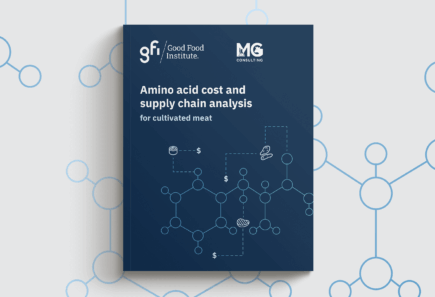
The costs and environmental impacts of cultivated meat
A life cycle assessment (LCA) and techno-economic assessment (TEA) show that by 2030, cultivated meat could have lower overall environmental impacts, a smaller carbon footprint, and be cost-competitive with some forms of conventional meat.
Explore the reports
Explore CE Delft’s full reports and GFI’s summaries
Key findings and future directions
Earlier this year, independent consultancy CE Delft published a life cycle assessment and a techno-economic analysis of a large-scale cultivated meat production facility model. These studies show that by the year 2030, cultivated meat could have a lower carbon footprint and reduced overall environmental impacts compared to conventional meat production, while being cost-competitive with some conventional meat. As the industry scales and cultivated meat production becomes more efficient beyond 2030, further cost decreases and environmental impact reductions are expected.
Data from industry partners
Unlike previous assessments that relied on academic projections, these new studies were informed by data collected from more than 15 industry partners, including five cultivated meat companies and Singapore’s Agency for Science, Technology and Research (A*STAR). Even though these studies paint the most complete picture of the costs and environmental impacts of large-scale cultivated meat production to date, data gaps still exist. Assumptions may change as the nascent cultivated meat industry matures.
The insights from the reports can prioritize efforts to address the most pressing technical and economic bottlenecks, thus accelerating the development and scalable deployment of cultivated meat.

WEBINAR
The environmental impact of cultivated meat production
Elliot and CE Delft LCA Specialist Pelle Sinke, M.Sc., review the updated data on the environmental impacts of cultivated meat versus conventional meat. Powered by data from over 15 companies across the cultivated meat supply chain, they address emissions, land use, water use, air pollution, feed conversion, and more.

WEBINAR
The costs and environmental impacts of cultivated meat
GFI Senior Scientist Elliot Swartz, Ph.D., explains the key insights from a recent life cycle assessment (LCA) and techno-economic analysis (TEA) modeling a future large-scale cultivated meat production facility.
GFI’s summaries and commentary on the LCA/TEA reports
Our experts provide summaries of the LCA/TEA data in the resources below.
Delve into the science of the full reports
These LCA and TEA studies, conducted by CE Delft, are the first to use primary data from multiple cultivated meat companies. The assessments also incorporated data from companies throughout the cultivated meat supply chain. All data were cross-checked by independent experts. Analyzing the results of both studies shows areas of overlap in factors that reduce both costs and environmental footprint: energy efficiency, energy source, efficient use and production of cell culture medium, and collaborations across the supply chain.
The LCA and TEA were conducted by the Dutch firm CE Delft. GFI and the European organization GAIA commissioned the LCA, and GFI commissioned the TEA.
Related resources

UNEP Global Environment Outlook 7
UNEP’s GEO-7, the most comprehensive scientific environmental assessment ever conducted, highlights the importance of alternative proteins.

Sensory evaluation guide for alternative proteins
Explore practical sensory science best practices that connect alternative protein product development with consumer insight.

Amino acid cost and supply chain analysis for cultivated meat
This white paper explores how to make amino acids affordable for cultivated meat, offering research and supply chain paths for industry growth.

Developing continuous cell lines for cultivated seafood
Our guide offers practical advice to overcoming common technical challenges, based on survey results and interviews with industry and academic researchers.





